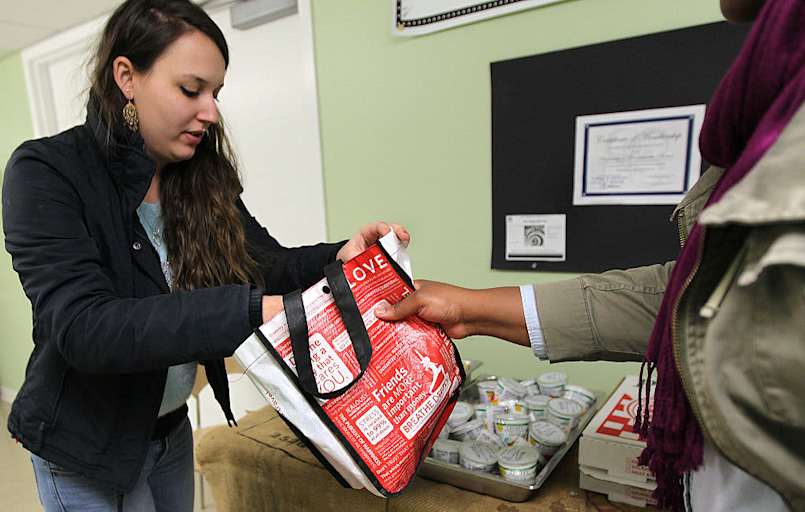I Had to Navigate Food Insecurity in College. This Is What I Learned.
College life is often romanticized as a time of self-discovery, academic growth, and forging lifelong friendships. But for many like myself, beneath the surface of this idealized experience, the harsh reality of food insecurity and poverty can easily go unnoticed by onlookers.
As a college student who has navigated the labyrinth of hunger on campus, I understand the shame that can come along with not being able to access your most basic needs. As a fat-identified person, I especially understand the paradoxical nature of weight loss due to hunger rather than intentional lifestyle changes.
I share my experience in hopes that it reaches someone else who feels too ashamed to speak up and helps other students navigate food insecurity.
The Silent Struggle I Endured
Unlike many challenges of student life that are readily discussed, including issues related to time management, financial aid, and social life on campus, the shame and stigma associated with not having enough to eat often kept me from opening up about my experiences. I found myself caught in this web of silence, grappling with hunger pangs while trying to maintain a facade of normalcy.
I grew up in eastern Kentucky on SNAP benefits for most of my life, and while money was always short, we typically had access to plenty of food. I am a fat-identified woman who entered college at a pretty high weight. Within the first two years of college, I lost over 80 pounds and found that I enjoyed the attention that my slimmer body afforded, but I could not be honest when people asked me about my weight loss “secret.”
A secret, indeed, it wasn’t until my junior year when, while working a double shift at the library’s café, I passed out at the register with a line of at least a dozen people waiting. I hit my head on the register on the way down and came to with a nursing student and my manager trying to rouse me. One of my friends happened to be in line for her coffee when I passed out and escorted me outside. Once I recovered, I took my 15-minute break, smoked a cigarette, drank some of her cherry soda, and got back to work to finish my shift. I was on autopilot.
Lightheadedness continued to follow me around, and I had no idea about things like low blood sugar or why I might be passing out. I went to student health, where they told me I was having simple episodes of hypoglycemia and that I needed to make sure I was eating enough. I was still over 200 pounds at the time and could not wrap my mind around being malnourished enough to pass out. I think I figured my body could survive on fat reserves and that I could tolerate the hunger.
My body being simultaneously fat and hungry and big and weak made no sense to me, so I didn’t feel like I could talk to anyone about being hungry because I didn’t fit the image of what I thought a hungry person should look like. I didn’t reach out for help until I realized that I actually needed it.
Community and Connection Where I Least Expected It
Once I began to accept that my health was directly impacting my work and my academics, I figured out ways to strategize how and when I could eat and get food. Working in food service, both in the library café and in the campus cafeteria, I often performed inventory audits and threw away food items after their “best by” dates. Instead of throwing them away, I began taking one or two sandwiches or pastry items to store in my dorm room.
My manager at the coffee shop, who lovingly called herself my “java mama,” realized what I was doing. But rather than reprimanding me, she also began setting things aside for me. The amount of ciabatta bread sandwiches I ate over the last couple of semesters was astounding and a complete godsend. I found myself performing better in my classes, being more physically active, and feeling very strong. My weight loss stopped, but my quality of life became so much better.
School breaks remained challenging, however. I never had a stable place to return to during extended school breaks, so I typically remained on campus during holidays and eventually moved into a shared apartment to spend summers. Summers were a little easier than the shorter holiday breaks because campus remained open, and I continued to work either at the café or in the cafeteria. As a result, I could access free meals during my shifts and take advantage of day-olds and other food items that would’ve been thrown away.
During the shorter breaks, however, I had to get creative with finding meals. I became very good at finding low-cost, high-calorie options within walking distance of campus or my apartment. One of my more creative (and perhaps desperate) strategies involved realizing I had money left on my book voucher at the end of the semester and going to the campus bookstore to stock up on non-perishable foods and snacks to get me through winter break. It was often a stretch, but I made do.
What I did not do, however, was tell anyone. My “java mama” understood what was happening, but we did not discuss it. I didn’t know that this was an experience that other students were having, and I was far too embarrassed to open up to my friends or ask for extra help.
I vividly recall nights spent studying on an empty stomach or lying to my friends that I had just eaten when going out to dinner, justifying my behavior of only ordering water and eating the table’s complimentary chips and salsa.
What’s even more conflicting is that, when faced with extremely limited resources, people constantly judge how you spend your money — as if enough financial discipline could help me out of the poverty I faced. I was a moderately heavy cigarette smoker, and given the choice between needing food or buying cigarettes, I would choose the cigarettes. Even at a young age, it wasn’t lost on me that this looked like a really irresponsible habit. And it absolutely was.
Looking back, though, I try to offer myself grace and understanding. Now, I can clearly see that the problem was and is so much bigger than anything I could have conquered by simply making more responsible choices.
The Invisible Face of Food Insecurity
To truly tackle food insecurity in college, it is essential to address its root causes. Beyond providing short-term solutions like food banks and campus pantries, institutions must engage in systemic changes. Affordable meal plans, increased financial aid, and proactive outreach programs can make significant impacts.
Additionally, destigmatizing the conversation around food insecurity is crucial in creating an environment where students feel comfortable seeking help without judgment. One of the misconceptions about college food insecurity is that it only affects certain demographics of students. However, the invisible face of this issue spans a diverse range of students, transcending socioeconomic backgrounds.
I come from an impoverished background, but I made it my mission to conceal any evidence of this, including keeping my hunger a secret. I sincerely hope that other students going through the same challenges I have can overcome this shame and seek help.
In many states, as long as you’re working a certain amount of weekly hours (which many of us are), you can qualify for SNAP benefits. College students often don’t see this as an option, but it is certainly one worth exploring unapologetically.
My journey through college food insecurity was a challenging one, but it was also a transformative experience. It taught me resilience, resourcefulness, and the importance of empathy.
As I reflect on those years, I am hopeful that by sharing my story, I can contribute to the ongoing conversation about the need for change. Every student deserves the opportunity to pursue education without the burden of hunger. Our collective responsibility is to ensure that no one goes unnoticed in the shadows of food insecurity on college campuses.
Meet the Author

Sandra Carpenter is a doctoral candidate in Gender Studies at Indiana University Bloomington. She has an MA in Women’s and Gender Studies from the University of South Florida and a BA in Creative Writing from Eastern Kentucky University. Sandra’s research and writing focus on Feminist Geography, Appalachian Studies, and Critical Race and Postcolonial Studies.





